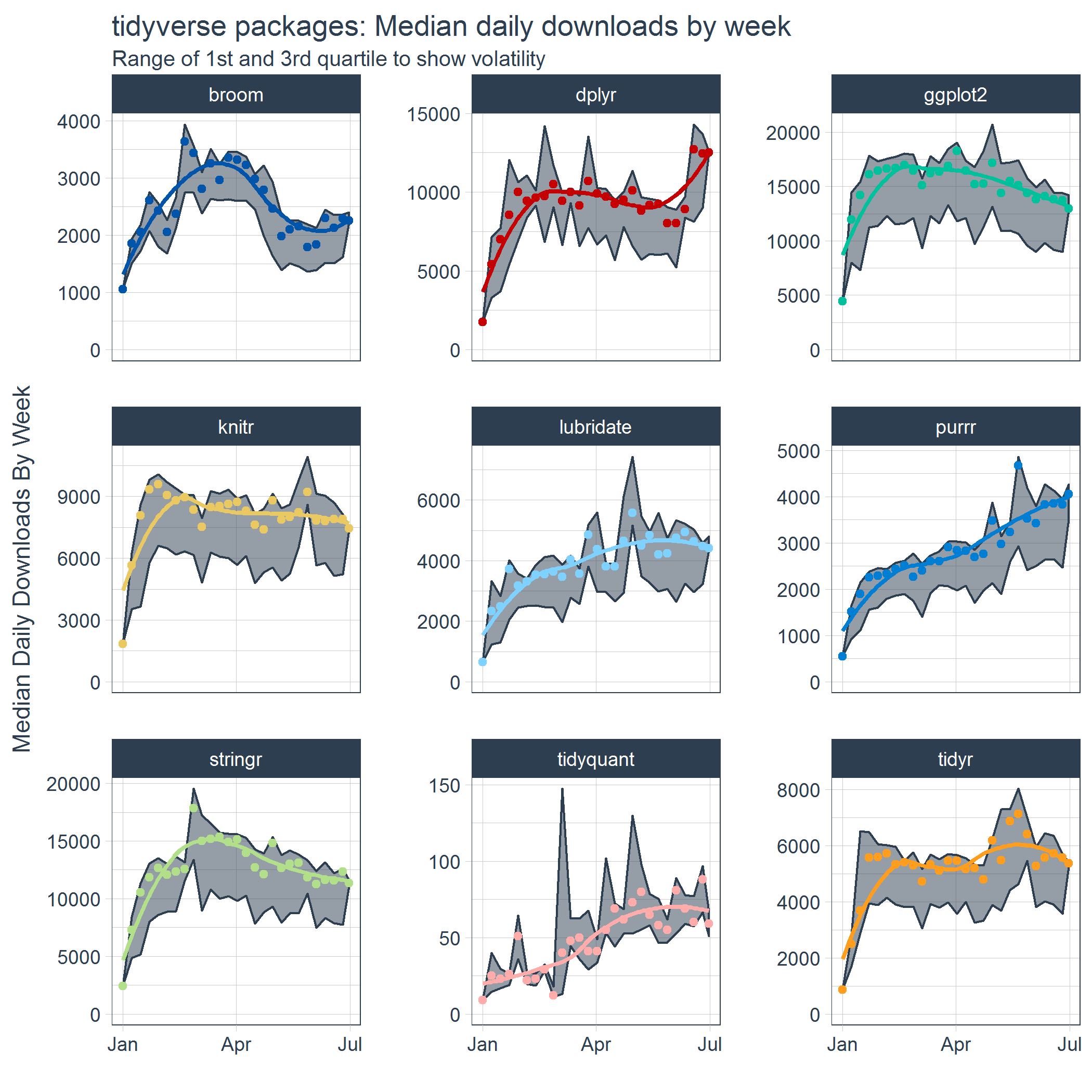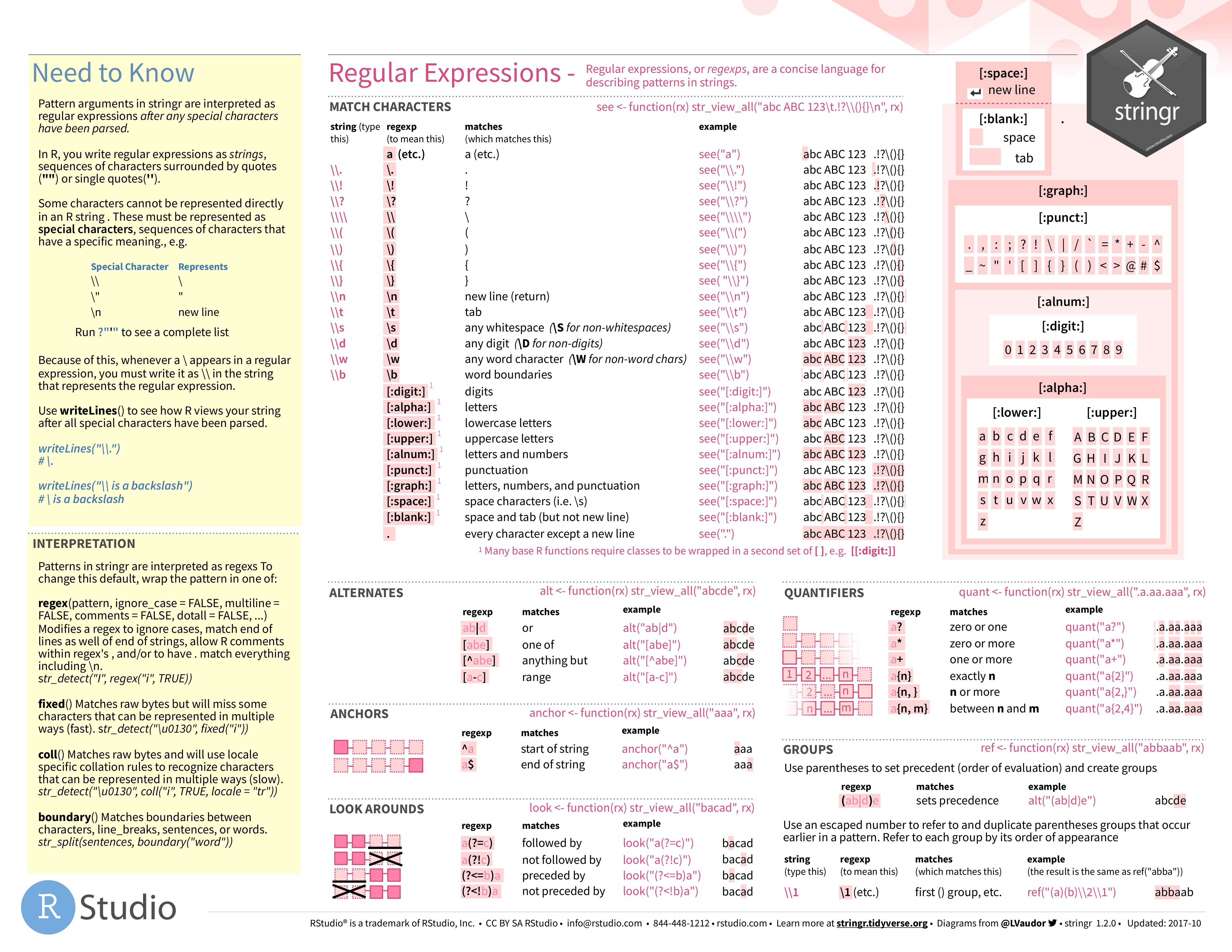Big Data¶
Parallel Computing¶
- parallel. PDF.
sparklyr¶
- Cheat Sheet for R Data Visualizations. May 21, 2019; 8. It can automatically graph data from an xts object. You can also add overlays like shaded.
- The XSS cheat sheet provides you a list of snippets to be used in detecting XSS vulnerabilities.
본 문서는 지속적으로 업데이트됩니다.Basic123456789 link.
- sparklyr. PDF.
Data mining and modeling¶
- Data Mining. PDF only.
- association rules, sequential patterns, classification & prediction, regression, clustering, outliers, time series, text mining, socila networks, graph mining, spatial data, statistics, graphics, data manipulation, data access, big data, parallel computing, reports, weka, editors, guis
data.table¶
- data.table Intro. PDF only (explanatory article).
- data.table. PDF.
dplyr¶
- Grammar of dplyr. PDF only (explanatory slides).
- dplyr. PDF.
forcats¶
- forcats. PDF.
sjmisc¶
- sjmisc. PDF.
Import and Tidy up¶
- readr and tidyr. PDF.
Machine Learning¶
caret¶
- caret. PDF.
estimatr¶
- estimatr. PDF.
h2o¶
- h2o. PDF.
Keras¶
- Keras. PDF.
Machine Learning¶
Machine Learning. PDF only.
- Supervised Learning;
- Unsupervised Learning;
- Deep Learning;
- Machine Learning Tips and Tricks;
- Probabilities and Statistics;
- Linear Algebra and Calculus.
Big Data Machine Learning. PDF only.
- linear regression, logistic regression, regularization (ridge, lasso), neural network, support vector machine, nayesian network and naïve bayes, k-nearest neighbors, decision tree, tree ensembles (bagging or random forest, boosting)
Machine Learning Modelling in R. PDF.
mlr¶
- mlr. PDF.
Regressions¶
- Regressions. PDF only.
- linear model, variable selection, diagnostics, graphics, tests, variable transformation, ridge, segmented, gls, glm, nls, gnls, loess, splines, robust, structural equation, simultaneous equation, pls, principal components, quantile, linear and nonlinear mixed effects, generalized additive, survival analysis, classification & regression trees, beta
Survival Analysis¶
- survminer. PDF only.
- curve, ggplot2, cox model
NLP¶
quanteda¶
- quanteda. PDF.
Regex¶
- Basic Regular Expressions. PDF.
stringr¶
- stringr. PDF.
xplain¶
- xplain. PDF.
Probabilities and randomness¶
Probabilities¶
Probability Cheat Sheet. PDF only.
Probabilities. PDF.
randomizr¶
- randomizr. PDF.
vtree¶
- vtree. PDF.
Programming¶
purrr¶
- purrr. PDF.
rlang¶
- rlang. PDF.
Python¶
reticulate¶
- reticulate. PDF.

Quandl¶
Xts Cheat Sheet 2020
- Quandl. PDF.
Time Series¶
lubridate¶
- lubridate. PDF.
nardl¶
- nardl. PDF.
Time series¶
- Time Series. PDF only.
- input, decomposition, tests, stochastic, graphics, miscellaneous
tsbox¶
- tsbox. PDF.
xts¶
- xts. PDF.
Tidyverse¶
- Tidyverse. PDF.
Syntax¶
- Syntax. PDF.
Even though the data.frame object is one of the core objects to hold data in R, you’ll find that it’s not really efficient when you’re working with time series data. You’ll find yourself wanting a more flexible time series class in R that offers a variety of methods to manipulate your data.
xts or the Extensible Time Series is one of such packages that offers such a time series object. It’s a powerful R package that provides an extensible time series class, enabling uniform handling of many R time series classes by extending zoo, which is the package that is the creator for an S3 class of indexed totally ordered observations which includes irregular time series.
xts has a lot to offer to make your time series analysis fast and mistake free, but it can take some time to get used to it.
This xts cheat sheet provides you not only with an overview of the xts object, how to create and inspect them, but also goes deeper into how you can manipulate time series with xts: you’ll see how to replace and update values, how to select, index and subset your objects, how to handle missing values and how to perform arithmetic operations.
Click on the button below to see (and download) the xts cheat sheet:
(Click above to download a printable version or read the online version below.)
This cheat sheet will help you to get yourself up to speed in no time!
:target:before { content:””; display:block; height:150px; margin:-150px 0 0; } h3 {font-weight:normal; } h4 { font-weight: lighter; }R For Data Science Cheat Sheet: xts
eXtensible Time Series (xts) is a powerful package that provides an extensible time series class, enabling uniform handling of many R time series classes by extending zoo.
Load the package as follows:
Xts Objects
xts objects have three main components:
- coredata: always a matrix for xts objects
- index: vector of any
Date,POSIXct,chron,yearmon,yearqtr, orDateTimeclasses - xtsAttributes: arbitrary attributes
Creating xts Objects
Convert To And From xts
Import From Files
Inspect Your Data
Extract core data of objects
Extract index from objects
Class Attributes
Get index class

Replacing index class
Get index class
Change format of time display
Time Zones
Change the time zone
Extract the current time zone
Periods, Periodicity & Timestamps
Sims 4 cc realistic. Estimate frequency of observations
Convert xts5 to yearly OHLC
Convert xts3 to monthly OHLC
Convert xts5 to quarterly OHLC
Convert to quarterly OHLC
Convert to yearly OHLC
Count the months in xts5
Count the quarters in xts5
Count the years in xts5
Make index unique
Remove duplicate times
Round index time to the next n seconds
Other Useful Functions
Extract raw numeric index of xts1
value of weekday in index of xts3
Value of hour in index of xts3
Extract first observation of xts3
Extract last observation of xts4
Display structure of xts3
Extract raw numeric index of xts1
First part of xts2
Last part of xts2
Export xts Objects
Replace & Update
Replace values in xts2 on dates with 0
Replace dates from 1961 with NA
Replace the value at 1 specific index with NA
Applying Functions
Locate endpoints by time
Calculate the yearly mean
Split xts5 by year
Create a list of yearly means
Find the last observation in each year in xts5
Calculate cumulative annual passengers
Apply standard deviation to rolling margins of xts5
Selecting, Subsetting & Indexing
Select
Subset
Get all data from 1954
Extract data from Jan to March ‘54
Get all data until March ‘54
Dr web serial. Subset xts4 using ep2
first() and last()
Indexing
Extract rows with the index of xts3
Extract rows using the vector days
Extract rows using days as POSIXct
Index of weekend days
Extract weekend days of xts1
Missing Values
Omit NA values in xts5
Fill missing values in xts2 using last observation
Fill missing values in xts2 using next observation
Interpolate NAs
Arithmetic Operations
coredata() or as.numeric()
Xts Cheat Sheet R
Shifting Index Values
Period-over-period differences
Lagged differences
Reindexing
Merging
Going Further
Xts Cheat Sheet Printable
Want to know more about xts? Check out DataCamp’s Manipulating Time Series Data in R with xts & zoo course!
